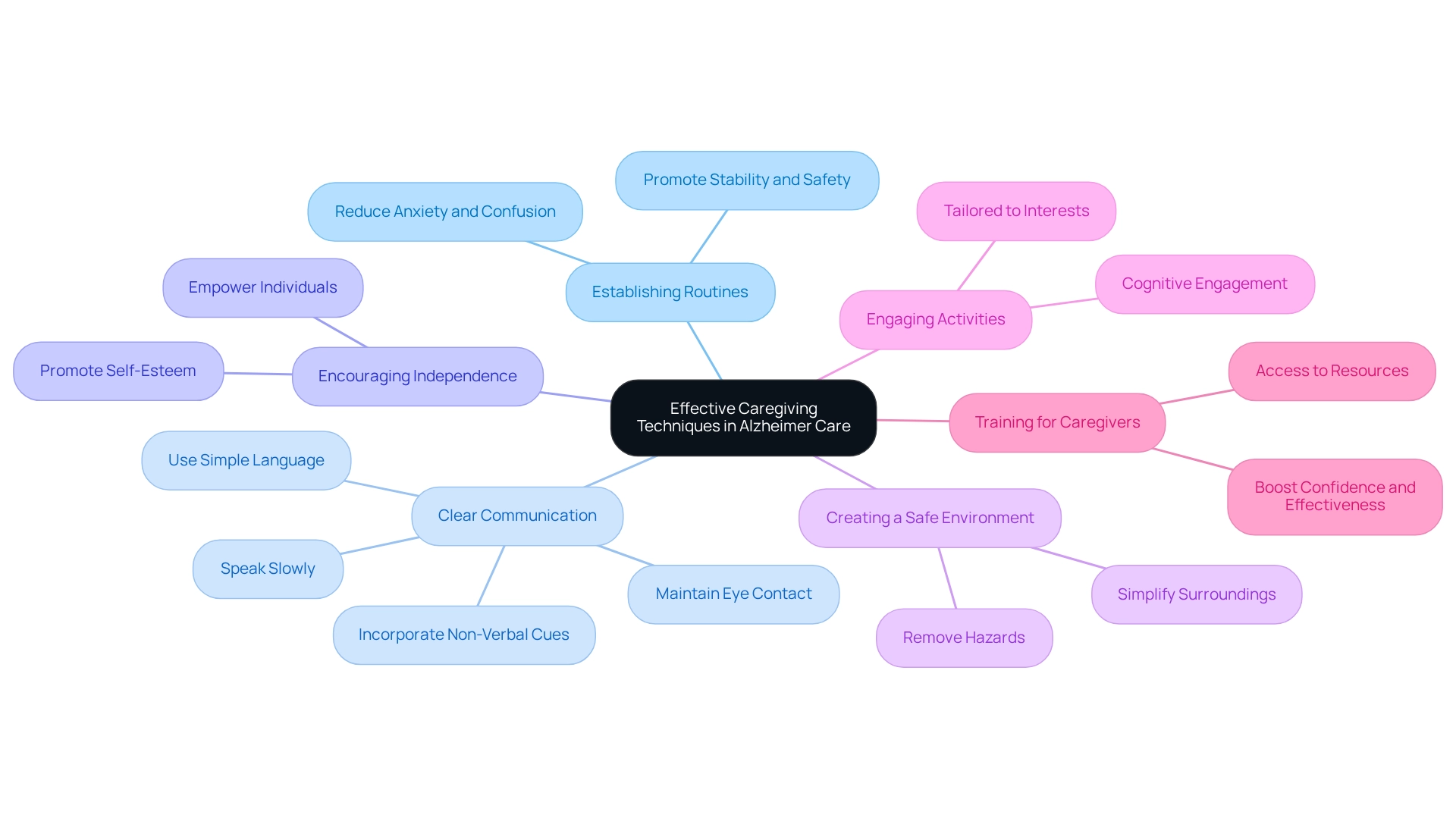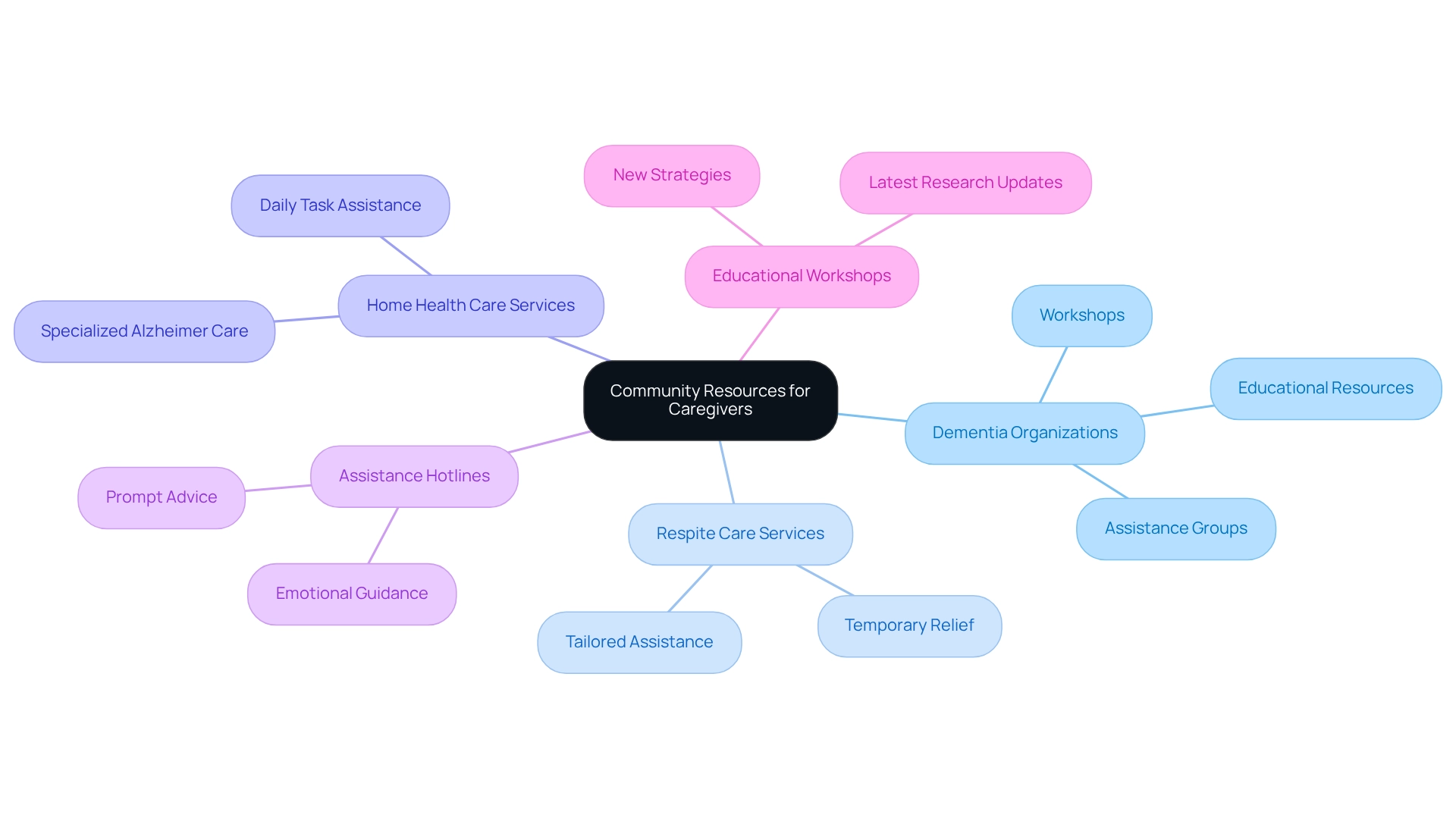Overview
Caring for individuals with Alzheimer’s requires essential strategies that focus on understanding the stages of the disease. It’s important to implement effective caregiving techniques while prioritizing the health of caregivers. By leveraging community resources, we can ensure that both individuals with Alzheimer’s and their caregivers receive the support they need.
Tailored care approaches not only enhance the quality of life for those living with Alzheimer’s but also play a crucial role in supporting caregivers in managing their well-being. Emotional support and practical assistance from professional services are vital components of this journey. Remember, you are not alone in this; we’re here for you, and your comfort is our priority.
Introduction
In the intricate landscape of Alzheimer’s care, understanding the disease and its various stages is paramount for both caregivers and families. As this progressive neurological disorder unfolds, it presents unique challenges that demand tailored approaches to support those affected. With projections indicating that over 6 million individuals in the U.S. will be living with Alzheimer’s by 2025, the urgency for effective caregiving strategies has never been greater.
This article delves into the complexities of Alzheimer’s, highlighting the importance of recognizing its stages and implementing effective caregiving techniques. Furthermore, prioritizing caregiver well-being and leveraging community resources is essential. By equipping caregivers with the knowledge and tools necessary to navigate this journey, we can foster a more compassionate and supportive environment for both patients and their families. Remember, we’re here for you, and your comfort is our priority.
Understand Alzheimer’s Disease and Its Stages
Alzheimer’s disease is a progressive neurological disorder that deeply affects memory, thinking, and behavior, typically advancing through several distinct stages that can be challenging for both individuals and their loved ones:
- Preclinical Stage: At this stage, individuals may show no noticeable symptoms; however, brain changes can be detected through advanced imaging techniques.
- Mild Cognitive Impairment (MCI): Individuals may experience memory lapses and difficulty concentrating, yet they can still manage daily activities independently.
- Mild Cognitive Impairment: Memory loss becomes more apparent, with individuals finding it increasingly difficult to complete familiar tasks and experiencing confusion about time or location.
- Moderate Dementia: This stage is characterized by heightened memory loss and confusion, including trouble recognizing friends and family, as well as difficulties in communication.
- Severe Alzheimer’s: Individuals may lose the ability to respond to their environment, requiring full-time assistance, and may undergo significant personality changes.
Understanding these phases is essential for those providing assistance, as it enables them to tailor their strategies effectively to meet the unique needs of each stage. The absence of CNA/HHA caregiver services can lead to several risks for seniors, including health decline due to unmonitored chronic conditions, poor nutrition from inadequate meal preparation, and hygiene issues that can result in infections. Furthermore, limited mobility assistance increases the risk of falls, while social isolation can lead to feelings of depression and anxiety.
CNA/HHA services offer crucial advantages, such as emotional support and medication oversight, which are vital for maintaining the well-being of seniors with cognitive impairments. Studies indicate that preserving physical health is essential for overall well-being, even in the context of dementia. In 2025, it is predicted that more than 6 million people in the U.S. will receive a diagnosis of dementia, underscoring the significance of personalized treatment strategies. This increasing occurrence highlights the importance of dementia support, which, if viewed as a global economy, would rank as the 14th largest worldwide.
Recent studies emphasize the necessity for culturally aware care, especially for older Black and Hispanic Americans, who are disproportionately impacted by dementia. The case study titled “Cultural Competence in Dementia Care” illustrates the need for targeted outreach and support that addresses the unique needs of diverse populations affected by dementia. As Dr. Michael Woodward, an Associate Professor and Dementia Australia Honorary Medical Advisor, observes, “A medical specialist will only make a diagnosis of this condition after careful assessment.” This highlights the importance of understanding the diagnostic process. As our knowledge of dementia progresses, those who support patients are encouraged to stay updated on the latest discoveries and professional insights to provide the most effective assistance. We’re here for you, and your comfort is our priority.
Implement Effective Caregiving Techniques
Effective caregiving strategies in Alzheimer care for individuals with dementia are crucial for improving their quality of life and assisting caregivers. By establishing routines, we can promote a feeling of stability and safety, which is essential for individuals experiencing cognitive decline. Research indicates that routines can significantly reduce anxiety and confusion, making daily activities more manageable. According to the 2024 Alzheimer’s Disease Facts and Figures report, the proportion of individuals who died at home increased from 15% to 37% between 2002 and 2021. This highlights the importance of Alzheimer care in creating a familiar and comforting environment for those living with Alzheimer’s.
In addition, using clear communication is vital in this journey. Caregivers, including CNAs and HHAs, should:
- Speak slowly
- Use simple language
- Maintain eye contact
Incorporating non-verbal cues, such as gestures, can further aid understanding and connection. Caregivers also play a crucial role in keeping families informed about the patient’s condition. The U.S. Surgeon General observed that ‘COVID-19 has been a completely and distinctly traumatic experience for the health workforce, and for their families,’ highlighting the emotional impact on those providing care and the necessity for strong assistance systems.
Furthermore, encouraging independence can empower individuals. Allowing them to perform tasks they can manage promotes self-esteem and a sense of control. This method not only empowers them but also reduces some of the caretaker’s responsibilities. CNAs and HHAs, available for hourly services with no minimum requirement, play a crucial role in supporting this independence by assisting with activities of daily living while respecting the individual’s capabilities.
Creating a safe environment is paramount as well. Caregivers should remove hazards and simplify the surroundings to prevent confusion and accidents, ensuring that individuals can navigate their spaces with confidence.
Engaging in activities tailored to the individual’s interests and abilities encourages cognitive engagement and emotional well-being. Activities that resonate with the person’s past experiences can be particularly beneficial.
These methods not only assist the person with Alzheimer’s but also improve Alzheimer care by empowering aides, such as CNAs and HHAs, to handle their duties more efficiently. A case study on individual education and assistance needs emphasizes that better access to training and resources can boost confidence and effectiveness in handling care. This highlights the significance of continuous assistance and learning in caregiving positions, ensuring that those providing help are well-prepared to deliver the highest quality of service. Remember, we’re here for you, and your comfort is our priority.

Prioritize Caregiver Health and Support
Caregivers, your health is paramount. By prioritizing your well-being, you can continue to provide the compassionate support that those in your care truly need.
- Taking Breaks: Regular breaks are essential to prevent burnout. Respite care options, such as those offered by Best Care Nurses Registry, including 24-hour assistance, allow you the necessary time to recharge. This time is invaluable, enhancing your ability to offer quality help.
- Seeking Support: Have you considered joining a support group? Sharing experiences with others facing similar challenges can provide emotional backing and significantly alleviate feelings of isolation. You’re not alone in this journey.
- Practicing Self-Care: Engaging in activities that enhance your physical and mental well-being—such as exercise, hobbies, and relaxation techniques—is crucial. Nature therapy through outdoor activities is one strategy that promotes mental health and fosters social connections, helping you sustain your resilience.
- Accessing Professional Help: If feelings of stress or anxiety become overwhelming, seeking professional counseling or therapy is essential. Mental health professionals emphasize that addressing these feelings is crucial for sustaining your caregiving role.
- Educating Yourself: Understanding Alzheimer’s care empowers you, making you feel more competent in your responsibilities. It can lead to better care strategies and improved interactions with your loved ones, supported by patient education services from Best Care Nurses Registry.
As Jessica Turner, a support worker, observes, ‘Every day in this role presents new challenges and rewards.’ Through it all, the connection that develops between you and those you care for is truly special—built on trust, compassion, and steadfast encouragement. By concentrating on your well-being, you can maintain your capacity to offer empathetic assistance. This is especially important, considering that families incur 70% of the total lifetime expense of supporting someone with dementia.
Focusing on the well-being of caregivers not only aids you but also improves the quality of assistance given to individuals with dementia. Let’s remember, tailored help from Best Care Nurses Registry can make a significant difference. We’re here for you, ensuring your comfort is our priority.
Leverage Community Resources and Support Networks
Caregivers, we understand the challenges you face in your vital roles. It’s essential to actively explore a variety of community resources designed to support you. Here are some valuable options:
- Dementia Organizations: Local branches offer vital educational resources, assistance groups, and workshops tailored for caregivers. These initiatives foster a sense of community and shared experience. As a representative from the Alzheimer’s Association observed, “Our support services are essential for those providing Alzheimer care, as they offer the resources and community needed to navigate the challenges of caring for others.”
- Respite Care Services: Temporary relief is crucial. Family caregivers often report a 27.2% reduction in positive activities due to caregiving responsibilities. Respite support can greatly alleviate this issue, allowing you to rejuvenate and preserve your well-being. Best Care Nurses Registry provides adaptable respite assistance, ensuring that you can tailor the help according to your individual needs.
- Home Health Care Services: Professional support staff from Best Care Nurses Registry can assist with daily tasks, delivering specialized Alzheimer care that meets unique individual needs. This support not only enhances the quality of life for patients but also reduces the strain on caregivers, providing companionship and help customized to each person’s circumstances.
- Assistance Hotlines: Numerous organizations operate hotlines where caregivers can receive prompt advice and emotional guidance, helping to alleviate feelings of isolation and stress.
- Educational Workshops: Engaging in workshops allows caregivers to acquire new strategies and stay updated on the latest studies and resources related to dementia support. For instance, an organization in Los Angeles offers activities and workshops aimed at keeping support providers active and involved while providing solutions for the daily challenges of caring for someone with memory impairment.
By utilizing these resources, you can enhance your skills, reduce stress, and significantly improve the overall quality of Alzheimer care for individuals. This ultimately fosters a more supportive environment for both caregivers and their loved ones. With around 14.5 million male caregivers in the U.S., it’s crucial to acknowledge the diverse demographics of those who provide care and tailor support services accordingly. The global economic impact of dementia care, if it were a country, would make it the 14th largest economy in the world, underscoring the importance of addressing caregiver needs on a larger scale.
For personalized support and to discuss your specific needs, remember, we’re here for you—contact Best Care Nurses Registry today.

Conclusion
Understanding the stages of Alzheimer’s disease is vital for caregivers and families. This knowledge allows for tailored support based on the unique challenges of each phase. The importance of CNA/HHA services cannot be overstated, as they help mitigate risks related to health decline, poor nutrition, and social isolation.
Effective caregiving techniques are essential for enhancing the quality of life for individuals with Alzheimer’s. Establishing routines, using clear communication, encouraging independence, and creating safe environments are strategies that benefit both patients and caregivers. These approaches not only foster comfort but also promote a sense of dignity.
Prioritizing caregiver health is equally important. Taking breaks, seeking support, and practicing self-care enables caregivers to maintain their well-being and resilience. Community resources, such as Alzheimer’s associations and respite care services, provide critical support that allows caregivers to recharge and improve their caregiving effectiveness. Remember, you are not alone in this journey.
In summary, fostering a compassionate environment for individuals with Alzheimer’s requires a comprehensive approach. This includes understanding the disease, employing effective caregiving strategies, and prioritizing caregiver well-being. As the prevalence of Alzheimer’s continues to rise, equipping caregivers with the necessary knowledge and resources is essential. Together, we can ensure that both patients and their families receive the compassion and support they deserve throughout this challenging journey.
Frequently Asked Questions
What is Alzheimer’s disease?
Alzheimer’s disease is a progressive neurological disorder that significantly affects memory, thinking, and behavior.
What are the stages of Alzheimer’s disease?
The stages of Alzheimer’s disease include: 1. Preclinical Stage: No noticeable symptoms, but brain changes can be detected. 2. Mild Cognitive Impairment (MCI): Memory lapses and difficulty concentrating, but individuals can manage daily activities independently. 3. Mild Dementia: More apparent memory loss, confusion in completing familiar tasks, and disorientation regarding time or location. 4. Moderate Dementia: Heightened memory loss, confusion, trouble recognizing friends and family, and communication difficulties. 5. Severe Alzheimer’s: Loss of ability to respond to the environment, requiring full-time assistance, and significant personality changes.
Why is understanding the stages of Alzheimer’s important?
Understanding the stages of Alzheimer’s is essential for caregivers to tailor their strategies effectively to meet the unique needs of individuals at each stage.
What risks do seniors face without CNA/HHA caregiver services?
Without CNA/HHA caregiver services, seniors may experience health decline due to unmonitored chronic conditions, poor nutrition from inadequate meal preparation, hygiene issues leading to infections, increased risk of falls due to limited mobility assistance, and social isolation that can result in depression and anxiety.
What advantages do CNA/HHA services provide for seniors with cognitive impairments?
CNA/HHA services provide crucial advantages such as emotional support and medication oversight, which are vital for maintaining the well-being of seniors with cognitive impairments.
How many people in the U.S. are predicted to be diagnosed with dementia by 2025?
It is predicted that more than 6 million people in the U.S. will receive a diagnosis of dementia by 2025.
Why is culturally aware care important in dementia support?
Culturally aware care is important because older Black and Hispanic Americans are disproportionately impacted by dementia, and targeted outreach and support are needed to address the unique needs of diverse populations.
What role does the diagnostic process play in Alzheimer’s disease?
The diagnostic process is crucial, as a medical specialist will only diagnose Alzheimer’s disease after careful assessment, highlighting the importance of understanding this process for effective support.
How can caregivers stay informed about dementia care?
Caregivers are encouraged to stay updated on the latest discoveries and professional insights related to dementia to provide the most effective assistance.











